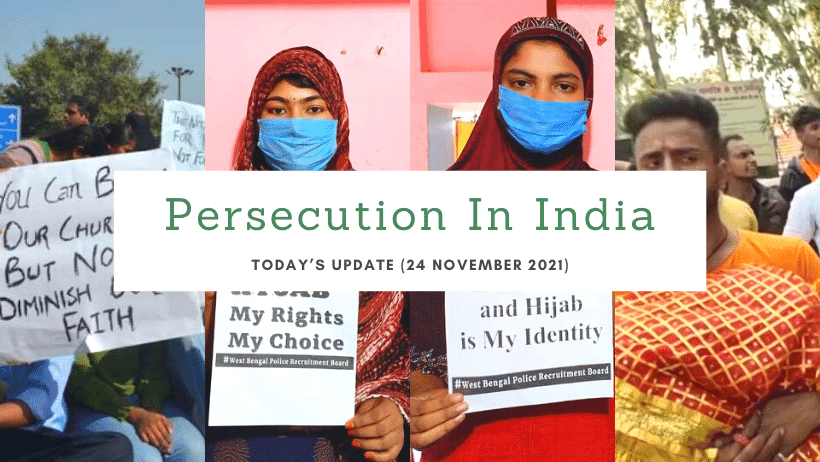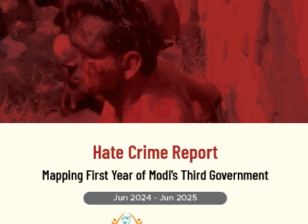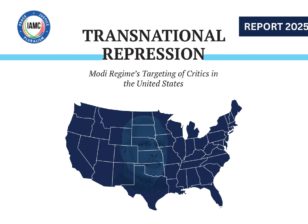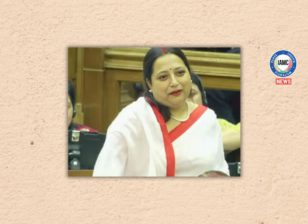Madhya Pradesh Government Orders Action Against Conversion, Harasses Christian Groups
Authorities in Madhya Pradesh’s Jhabua district ordered action against the alleged conversion of tribals to Christianity at prayer meetings without permission from the administration after the Hindu extremist group, the Vishwa Hindu Parishad (VHP), demanded a ban on such gatherings. Christian organizations have accused the administration of supporting the VHP, harassing the community and forcing many of them to cancel Sunday prayer meetings for a month now under pressure from groups allied with the state’s ruling Bharatiya Janata Party (BJP).
In an order, sub-divisional magistrate Anil Bhana cited demand number two of VHP functionary Kamal Maharaj’s memorandum and added there is a complete ban on “mass conversion” of tribals to Christianity without permission of the district magistrate in the scheduled area. “…so if any such event takes place under your jurisdiction, then take necessary action immediately,” he said.
The VHP, an affiliate of BJP’s ideological fountainhead Rashtriya Swayamsewak Sangh (RSS), has been campaigning in Jhabua against the alleged “illegal conversion” of tribals. Maharaj said earlier they did not have any way to check the “illegal conversion.”
He added after the anti-conversion law was passed this year in Madhya Pradesh, they were confident of a ban on them. “We are holding a campaign and also seeking the support of district administration to stop the illegal conversion.” Madhya Pradesh is among the BJP-ruled states that have criminalised what they call forced religious conversion. Critics of the legislation say they are being misused to target minorities.
Hindu Extremists Protest Investigation Of Police Officer Who Shot 7 Muslims
Hindu extremists, including leaders of Prime Minister Narendra Modi’s Bharatiya Janata Party (BJP), have demanded an end to an investigation into a police officer who stands accused of fake encounter in which seven Muslim men were shot on November 11 in Uttar Pradesh state.
The police officer, Rajendra Tyagi, was transferred after he shot the seven men, who were arrested and jailed for allegedly engaging in unlawful cattle trade, on their legs. Tyagi later wrote an official note objecting to his transfer and put it on social media.
Senior police officials subsequently began an investigation into the shooting and suspending Tyagi for violating the Official Secrets Act. Tyagi was being “punished and insulted” and this had “emboldened the criminals and cow-smugglers,” said Nand Kishore Gurjar, BJP legislator.
He accused police officials of enabling “illegal” cattle work in the district. Vijay Shankar Tiwari, a spokesman for the Vishwa Hindu Parishad, tweeted: “Inspector Tyagi did what should be done to cow smugglers. His transfer should be cancelled.”
Court Stays Police Recruitment After Applications From Muslim Women In Hijab Rejected
The High Court in West Bengal state has stayed the recruitment process of West Bengal Police Recruitment Board after a group of Muslim women filed a petition alleging their application forms for recruitment of constables were rejected because of wearing Hijab (headscarf) in the photograph. But this is only an interim order and the future of the applicants will be determined only after the final verdict is delivered, a judge wrote.
Tuhina Khatoon, one of the petitioners, said: “We have been preparing for this exam for a long time. But we were denied the opportunity. Now the court is listening to us and we hope that we will get justice.” Advocate Firdous Samim, who is representing the Muslim girls in this case, said that the “Constitution allows that a Muslim girl can wear Hijab but the notification given by the Police Board went against the Constitutional provisions.”
The West Bengal Police Recruitment Board (WBPRB) organized a preliminary examination to recruit constables and lady constables in the state police on 26 September 2021. The board issued admit cards for the exam on September 6. More than 30,000 students were left out because of various reasons including mistakes made while submitting their forms.
Among those left out were more than 1,000 Muslim girls because they were seen wearing headscarves or hijabs in the photos that they had attached with their forms. WBPRB guidelines say that the faces of the applicants should not be covered in any way in the photos. The girls who were excluded from the exam protested outside the Board’s office in Kolkata for several days.
They also sought an appointment with Chief Minister Mamata Banerjee but did not get one. Despite all the efforts, they were not allowed to sit in the exam after which they approached the high court to seek relief. Reacting to the stay order, Mafiqur Rahman, a Kolkata-based activist, said the court’s objection to the West Bengal Police Recruitment Board rules is a positive sign and raises the expectations of thousands to make their dreams come true.




